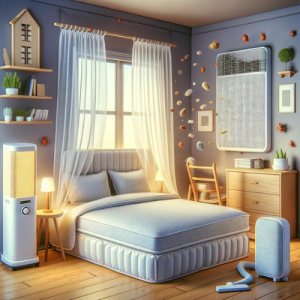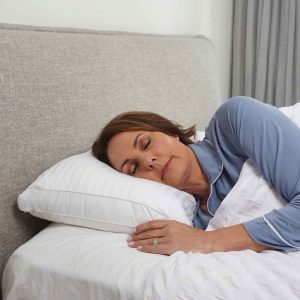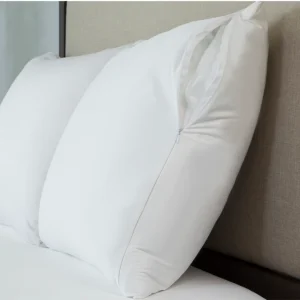Allergy-Free Comfort: Tips for a Restful Night's Sleep
Do you often find yourself battling with allergy symptoms while trying to get a good night's sleep?
If so, you're not alone. Allergens such as dust mites and pet dander can wreak havoc on your sleep quality, leading to runny noses, watery eyes, and nasal congestion that can disturb your nighttime rest. But fear not, there are steps you can take to minimize allergens in your bedroom and ensure a peaceful slumber. Let's explore some tips for sleeping without allergies.
Health Consequences of Poor Sleep Due to Allergies
Neglecting to address allergies that disrupt sleep can have significant consequences for your health and well-being. Poor sleep quality due to allergies can lead to chronic sleep deprivation, which has been linked to various health problems, including:
- Impaired cognitive function and decreased productivity
- Weakened immune system, making you more susceptible to infections
- Mood disturbances such as irritability, anxiety, and depression
- Increased risk of cardiovascular disease, including hypertension and heart disease
Furthermore, persistent exposure to allergens can exacerbate underlying respiratory conditions such as asthma, leading to more frequent asthma attacks and worsening symptoms. By prioritising allergy management and creating a conducive sleep environment, you can mitigate these risks and enjoy better overall health and quality of life.
Identify Common Allergens in Your Bedroom
Understanding the sources of allergens in the bedroom is crucial for creating a healthier sleep environment.
Dust mites, tiny creatures invisible to the naked eye, are a common allergen found in mattresses, pillows, and bedding. These microscopic pests thrive in warm, humid environments and feed on dead skin cells shed by humans.
Additionally, pet dander, consisting of tiny flecks of skin shed by pets, can accumulate in carpets, upholstery, and bedding, triggering allergic reactions in susceptible individuals.
Pollen, brought indoors on clothing and shoes, can settle on surfaces in the bedroom, while mould spores can thrive in damp areas such as bathrooms or basements, contributing to allergy symptoms. Identifying and addressing these sources of allergens is essential for improving sleep quality and overall well-being.

Protect Your Bedroom Against Allergens
- Dust Mites: Dust mites are microscopic organisms that thrive in mattresses, pillows, and bedding, feeding on dead skin cells shed by humans. To mitigate their presence:
- Encase your mattress: Invest in mattress protectors designed to create a barrier against dust mites. Products like the Allerzip® Fully Encased Mattress Protector
- Encase your pillow: Seal your pillow against allergens with the Allergy Sensitive Pillow from TheraMed, specifically engineered to prevent dust mites from infiltrating your bedding.
- Bed care: Wash bedding regularly in hot water to kill dust mites and remove allergens.
- Pets: Preferably, keep pets out of the bedroom, or designate specific areas where they are not allowed to be to reduce the spread of dander. Wash pet bedding regularly and groom pets frequently to reduce the amount of dander they shed.
- Cleaning: Vacuum carpets, rugs, and upholstery frequently use a vacuum cleaner equipped with a HEPA filter to trap pet dander and other allergens.
- Pollen: Pollen particles can be brought indoors on clothing and shoes, settling on surfaces in the bedroom and triggering allergic reactions. To limit exposure to pollen:
- Windows: Keep windows closed during peak pollen seasons, particularly in the early morning and evening when pollen levels are highest.
- Air: Use an air purifier with a HEPA filter to remove pollen particles from the air in your bedroom. Use a dehumidifier to maintain indoor humidity levels below 50%, inhibiting mould growth.
- Clothes: Change clothes and shower before bed to remove any pollen that may have been collected on your skin and hair throughout the day.
- Mould Spores: Mould spores thrive in damp, humid environments such as bathrooms or basements and can contribute to allergy symptoms. To prevent mould growth and reduce exposure to mould spores.

Choose the Right Mattress Protector
When choosing a mattress protector, opt for one that is waterproof and allergen-proof, like the Allerzip® Fully Encased Mattress Protector. This type of protector creates a barrier against allergens, preventing them from penetrating into the mattress and triggering allergic reactions. Look for features such as a dust-proof flap and SecureSeal® for added protection against allergens and bed bugs.
Invest in Allergy-Friendly Bedding
Invest in anti-allergy bedding, such as the Thera-med Allergy Sensitive Pillow, can make a significant difference in your sleep quality. This hypo-allergenic pillow is treated with a special health guard that repels common allergens, including bacteria and dust mites, ensuring a restful night's sleep for allergy-sensitive individuals. Pair it with an allergy-friendly quilt cover and an air purifier for a complete allergy-friendly sleep environment.
When to Seek Medical Advice
If allergy symptoms persist despite taking preventive measures and medication, it may be time to consult a doctor. Persistent symptoms, particularly those that interfere with sleep or daily activities, could indicate underlying issues that require medical attention. A doctor can conduct allergy testing to identify specific allergens triggering your symptoms and recommend appropriate treatment options, such as allergy shots or immunotherapy, to help manage your allergies effectively.
Enjoying a Night of Undisturbed Sleep
Follow these tips and investing in allergy-friendly bedding products, you can create a healthier sleep environment and enjoy a night of undisturbed sleep, free from the discomfort of allergies.
Stop to waking up with a runny nose and watery eyes, and hello to waking up feeling refreshed and ready to tackle the day ahead. Don't let allergies control your sleep any longer; take control with protective bedding products and enjoy a restful night's sleep, night after night.
Your questions answered
Antihistamines, decongestants, and nasal corticosteroids are commonly used to alleviate allergy symptoms and improve sleep quality. However, it's essential to consult with a healthcare professional before starting any medication regimen.
 0
0 0
0Yes, chronic exposure to allergens can exacerbate respiratory conditions like asthma and increase the risk of cardiovascular disease and other health issues over time.
 0
0 0
0Yes, allergies can exacerbate sleep disorders like insomnia or sleep apnea by causing discomfort and disrupting breathing patterns during sleep.
 0
0 0
0Protective bedding creates a barrier against allergens like dust mites and pet dander, reducing exposure and minimizing allergic reactions during sleep.
 0
0 0
0Allergies can lead to symptoms such as nasal congestion, sneezing, itching, and coughing, making it difficult to fall asleep or stay asleep throughout the night.
 1
1 0
0










